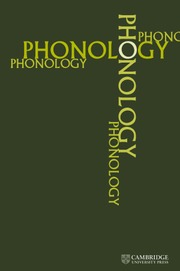Article contents
The power of locality domains in phonology*
Published online by Cambridge University Press: 14 August 2017
Abstract
Domains play an integral role in linguistic theories. This paper combines locality domains with current models of the computational complexity of phonology. The first result is that if a specific formalism – strictly piecewise grammars – is supplemented with a mechanism to enforce first-order definable domain restrictions, its power increases so much that it subsumes almost the full hierarchy of subregular languages. However, if domain restrictions are based on linguistically natural intervals, we instead obtain an empirically more adequate model. On the one hand, this model subsumes only those subregular classes that have been argued to be relevant for phonotactic generalisations. On the other hand, it excludes unnatural generalisations that involve counting or elaborate conditionals. It is also shown that strictly piecewise grammars with interval-based domains are theoretically learnable, unlike those with arbitrary, first-order domains.
- Type
- Articles
- Information
- Copyright
- Copyright © Cambridge University Press 2017
Footnotes
I am greatly indebted to two anonymous reviewers and the editors of this issue. Their detailed feedback led to major changes that hopefully have resulted in a much more accessible and phonologically grounded paper. This paper has also profited tremendously from regular discussions of subregular phonology with Alëna Aksënova, Hyunah Baek, Aniello De Santo and Chikako Takahashi.
References
REFERENCES
- 15
- Cited by


